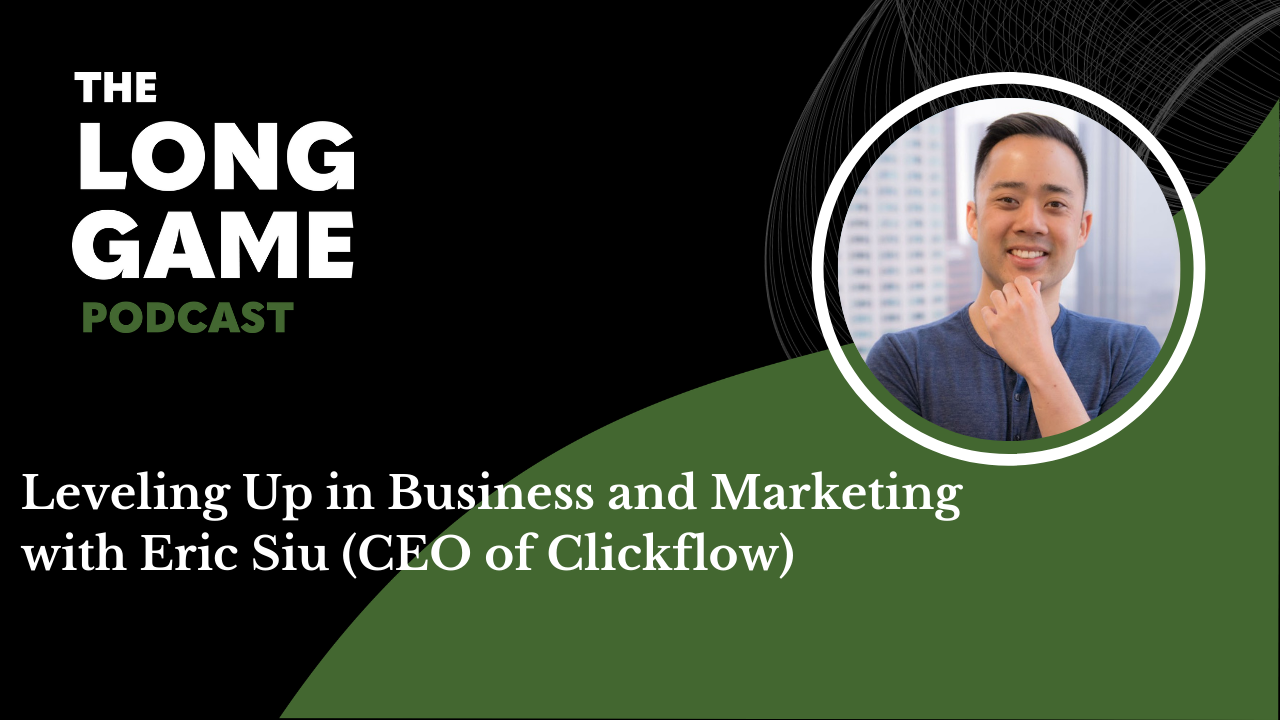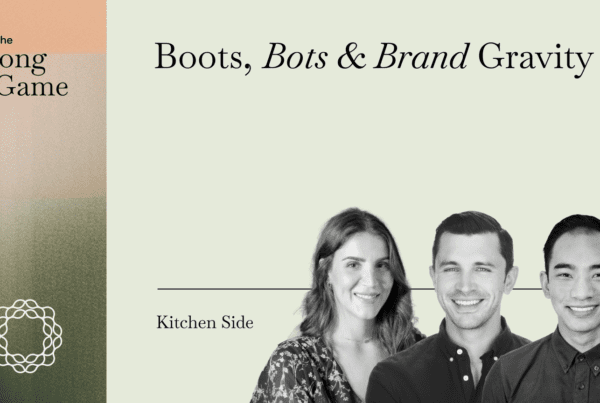
Eric Siu is the founder of content intelligence software ClickFlow, which helps you grow your traffic while looking like a genius.
He is also the Chairman of the ad agency Single Grain and has worked with companies such as Amazon, Airbnb, Salesforce and Uber to acquire more customers.
He hosts two podcasts: Marketing School with Neil Patel and Leveling Up, which combined have over 50 million downloads to date.
He also speaks frequently around the world on marketing and SaaS.
In this episode of The Long Game, David Ly Khim talks to Eric about his evolution from gaming to business, his thinking behind purchasing a failing agency, and what it takes to get to the top.
Check out ClickFlow.
Follow Eric Siu on LinkedIn or Twitter
Listen to the podcast
Watch the video
Scan the show notes
6:24 – Learning the long-game
From SEO strategies to poker games, Eric Siu got his long-game training on the job. Luckily, he’s seen that same long-term pattern with the world’s most successful entrepreneurs.
“When I first started learning SEO, I tried all the short-term stuff. So I tried all the blackout stuff, the articles, spinning stuff, and then I would test it on different projects on my own. And I would torch those projects. They would get a lot of traffic and then the next day they would get burned. And so I think I started learning the long game that started to get reinforced at that point. But even before that, when I played a lot of poker, that taught me to also think about the long game too. So I think probably it was those two, the poker and SEO are probably both like the best lessons for kind of long-term thinking….I’ve just found that what works best for me is, whenever I tried something short-term, it just doesn’t work out. But whenever I’ve stuck with something for the long term, it works out better. And then when you start to study kind of the patterns of the quote-unquote ‘most successful’ people in the world, whether they’re investors or entrepreneurs, usually they just stick with something for a long time and they figure it out. And that’s what it is.”
14:20 – Learn lessons from failure
Whether it’s an under-achieving co-worker or your own business mistakes, let failure motivate you and give you a guideline for better decisions.
“I was doing data entry, and I looked over, I was maybe 22 or 23 years old and there’s a guy that was 30 years old and he went to Harvard. One of my coworkers who was my friend would make fun of him all the time. I’m just like, ‘man. What if I become like him?’… Same exact job as me, went to Harvard. And then my colleague would make fun of him all the time. ‘Look at you, you went to Harvard, you’re 30 years old.’ It was actually kind of sad. But I was like, ‘man, I can’t let that happen to me.’ From there, that’s when all the self-help to self-development stuff started. And my friend – who now works at Airbnb – told me about digital marketing. And then I picked up an internship, changed five jobs the first year, and then basically within two years, I was leading marketing at an online education startup. And then like eight months after that, I got a chance to come in as a number two for the agency that I have right now called Single Grain. Eventually, like maybe six months after that, I had the chance to buy out everyone and I took over the entire company. That sounds amazing and all that, but don’t worry. Like I completely failed. I was actually telling my team today cause we’re working through an integration right now because we just bought another agency. I was like, ‘Hey guys, here’s all the things that went wrong and just go the opposite direction, just invert this.’ And so we had the playbook on how to not do it.”
23:33 – Set a clear mission and high goals
You don’t need to set your goals low to work for you. Choose a sky-high personal mission and motivate yourself to get just a bit closer to the finish line every day.
“Two years ago, this was pre-COVID, Neil and I had an event. And we had the founder of Activision speak and his mission is to help entrepreneurs achieve their dreams. And at the moment I was like, that’s not specific. People talk about specific goals. They talk about smart goals and all that. It was what he said right afterward that really resonated with me. He’s like, that’s what a mission is. It’s not supposed to be achievable. It’s something you can wake up to and get a little closer to every day. And so my mission now just personally, is to level up the world. And that’s much broader now, but now I’m like, okay, I can just be excited every day and just get a little closer to it. Each company can have a different mission, but I can have my overarching mission.”
26:40 – Level up instead of moving on
Eric’s leveling up philosophy encourages building success in one spot – leading to widespread change and improvement over time.
“Leveling up is something, it’s my philosophy. It’s what I’m going to work on the rest of my life. And so the way I see it is, we have a holding company, right? So the agency is one piece of it. We have a SaaS, we’re actually working on buying another SaaS company right now, and then there’s other kinds of acquisitions we’re working on. I just think that’s a way to have fun. You look at what Warren Buffet and Charlie Munger have done. They have a holding company and they just have fun. Like even at ages – they’re 90 plus now – they’re just having a blast, learning, interacting with people and that’s what it is. And then in the meantime, in your wake, you can affect a lot of change. I think that’s interesting. What I’m not interested in people talking – like the private equity model would be buying a business and flipping, right. I don’t think there’s anything wrong with that model, it’s not for me. I’m much better just buying something, holding it, and growing it. And that’s very much what leveling up is about. It’s buying something, holding it, and then just continue to get better and better over time.”
28:14 – Go high-leverage with your time
Know where you’re needed. For a busy entrepreneur, uncovering where you can make an impact should determine how you spend your time.
“It’s high leverage activities, right? So it could be doing deals. So it could be buying something. Recruiting is very high leverage as well. So I do know that if I’m reaching out to someone – there’s someone I’ve been trying to recruit for the last three and a half years who’s a superstar. Finally, I think we’re going to be able to get him. But I’ve had to nurture that relationship over the years. I’ve done that with a lot of our great people. And also creating content is high leverage as well. So doing this, you’re chopping this stuff up and then having a great team to focus on the brand. We’re getting better and better at that over the years. And we’ll continue to get better at that. And financing, right? So that’s keeping cash in the bank or raising money. It’s really those four things. That’s where I can have the highest kind of impact. Like sure. I can do everything. I can jump in. If someone needs me to screen someone, I can do it. But that’s not the best use of my time.”
29:19 – Swap out books for peer groups
There’s nothing like learning from your mistakes – or other people’s mistakes. Connect with your peers and attend conferences to gain insight from the entrepreneurs ahead of you.
“There’s a lot of reading to do. All the reading in the world’s not going to help you. Sometimes you just have to go out there and make mistakes. The other thing would be learning from other people’s mistakes in peer groups. So I’m in YPO. That’s a great peer group. I was in EO for about seven years or so. I learned a lot of stuff that I didn’t know that I didn’t know. And you know, back then people showed me stuff like, ‘Oh, you’ve got to do this cashflow forecast document. You’ve gotta do this. You’ve got to worry about this.’ I didn’t know these things cause I was 26 or 27 at the time when I took over a Single Grain. And these people were like in their mid-thirties, forties, fifties, and they just taught me a lot. And I think learning from the wisdom of others or throwing your own peer group or going to conferences like the Ted conference, I think these are all worthwhile endeavors and it just makes you a better person. So at the end of the day, is what you’re doing going to make you a better business person and also just a better person in general?”
32:33 – Pick role models selectively
Instead of idolizing today’s Forbes list, focus on the traits or messages that made them successful and apply to your growth as needed.
“The cliche answers would be Jeff Bezos or Bill Gates. But they have scandals going on. I think it’s – you look up to certain aspects of people, not every single thing. Right? So maybe I might disagree with some people on some things, but I might look up to them in other ways. You might look up to the Warren Buffetts, Jeff Bezos, the Elans of the world just because their thinking is so long-term, and it’s different from other people. So you want to zig where other people are zagging. I think for me now, the focus is becoming the best version of myself or continuing to do that. And you know, there’s only one of me. I mean, look, if there’s something that resonates with me that other people say then sure, I’ll be a fan.”
33:55 – The perks of social butterflies
Not a big schmoozer yourself? Coordinate networking events to reap the benefits of being an appreciated ‘connector’ just by hosting.
“When I go to conferences, I’ll throw the dinners because I’m an introvert and I’d rather just pay for everyone. And I get to curate whoever I want. And then if you’re the connector, everyone will remember you, and you just kind of continue to connect people. It’s free to connect people. So I find that whatever it costs to pick up the bill, it’s easily worth it because it’s interesting conversation that you’ve curated and it’s a good experience that you created.”
Connect with Omniscient Digital on social:
Twitter: @beomniscient
Linkedin: Be Omniscient
Listen to more episodes of The Long Game podcast here: https://beomniscient.com/podcast/


